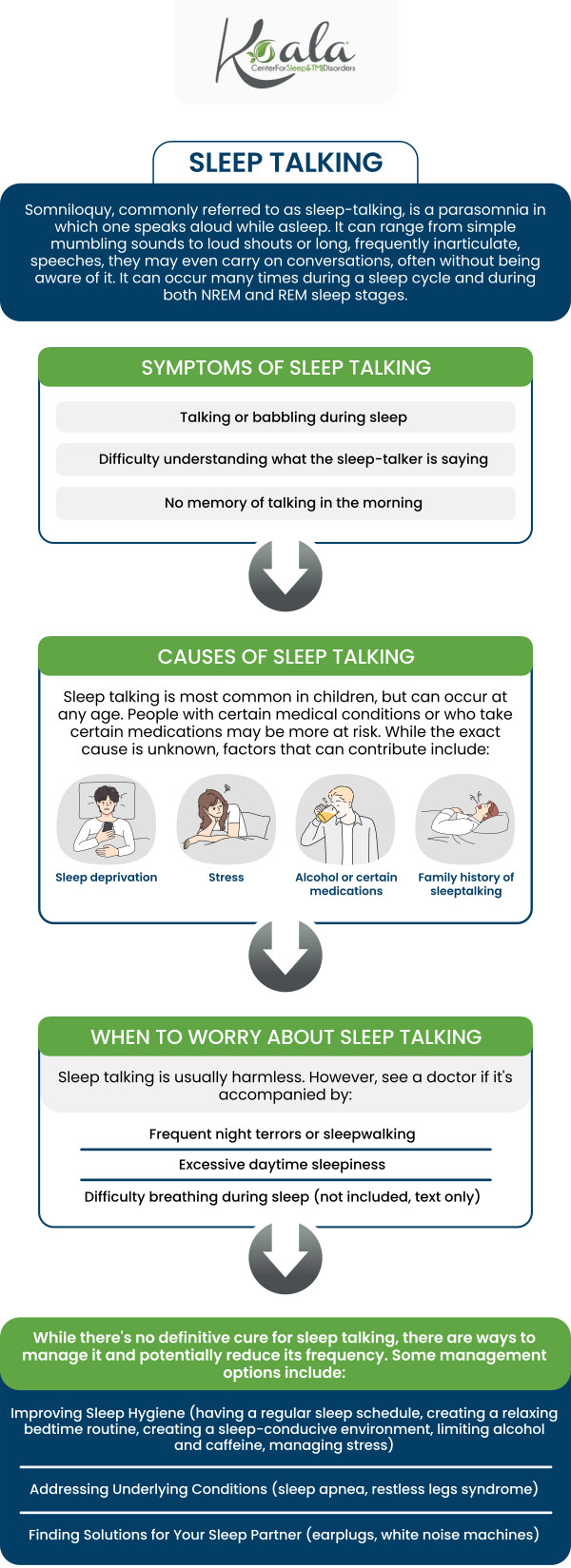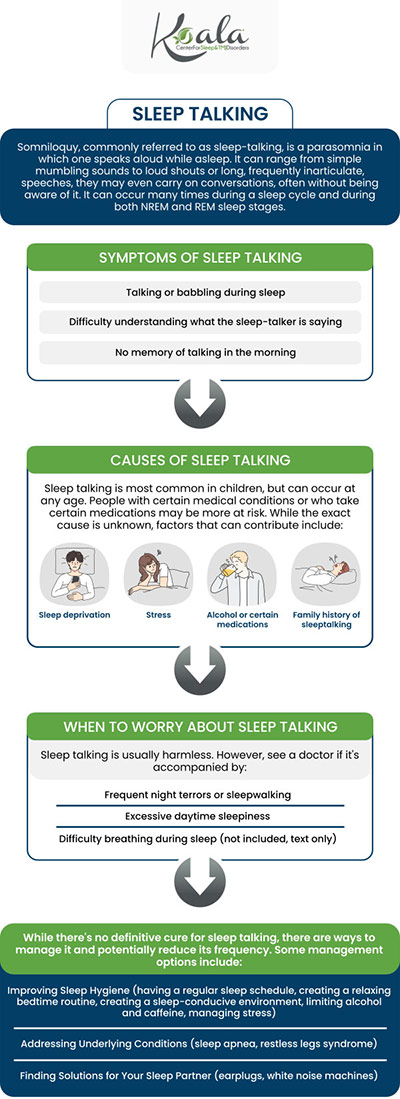Sleep Talking Causes and Treatments Q&A
Treatment for sleep talking is personalized, taking into account each person’s symptoms, health, lifestyle, and other influencing factors. While sleep talking often isn’t a cause for concern and might resolve on its own, if it becomes bothersome, disruptive, or indicative of a larger sleeping difficulty, seeking treatment is advisable. Sleep talking treatment is available at the Koala® Center For Sleep & TMJ Disorders. For more information, please contact us or book an appointment online now! We have convenient locations across the USA in Bloomington IL, Peoria/Dunlap IL, El Paso TX, and Wausau WI.




Table of Contents:
What causes you to talk in your sleep?
How can someone reduce their amount of sleep talking?
What symptoms are associated with talking in your sleep?
How is talking in your sleep treated?
Talking during sleep can arise from a variety of different sources and be present in many different ways. Some instances of sleep talking may not be cause for concern, while at other times, it could indicate underlying health issues. This phenomenon is considered a type of parasomnia, a category that includes abnormal behaviors exhibited during sleep.
The precise reasons behind sleep talking are not always clear, but it sometimes runs in families, suggesting a genetic component might be involved. Additionally, it appears more frequently among individuals who are experiencing mental health conditions, including stress and post-traumatic stress disorder.
Sleep talking most commonly occurs in children but can also appear in adults, especially when accompanied by additional conditions or health factors. Factors like certain medications, substance abuse, and fever can also trigger sleep talking. This makes it important to consult sleep experts at Koala® Center For Sleep & TMJ Disorders to determine if sleep talking is symptomatic of another sleep disorder.
To reduce sleep talking, the specific steps that will be most effective vary widely due to the broad spectrum of presentations and causes of sleep disorders. Consulting with sleep experts, such as those at Koala® Center For Sleep & TMJ Disorders, will involve the development of a personalized treatment plan.
Generally, there are health and lifestyle steps and guidance a sleep expert can provide to help manage the condition. This includes ensuring patients get sufficient sleep at night and implementing lifestyle changes like avoiding heavy meals close to bedtime and reducing alcohol consumption.
Adhering to a regular sleep schedule and establishing a nighttime routine that eases the brain into sleep could also minimize occurrences of sleep talking. Maintaining a healthy diet and exercise routine are further steps towards facilitating a regular and healthy sleep cycle, potentially reducing the risk of sleeptalking.
It’s also beneficial to discuss with a sleep expert any other sleep-related or health conditions that might influence the onset of sleep talking, including stress factors in an individual’s life, to address these underlying issues appropriately.
The symptoms of talking in sleep can vary in their presentation, from whispers to louder shouts, and may occur intermittently or be ongoing. The nature of sleep talking can also differ based on its cause, with the speech of sleep talkers being more comprehensible in earlier sleep stages and less so during deeper sleep stages. Severity is categorized by the frequency of occurrences, ranging from mild, with episodes happening less than once a month, to severe, where it occurs on a nightly or near-nightly basis.
Severe sleep talking may disrupt not only the sleep of the person experiencing it but also that of others around them, potentially leading to a broader range of health concerns due to disrupted sleep patterns.
Consulting with a sleep expert is recommended, especially if the sleep talking is frequent or severe, to determine if it’s related to other sleep disorders or health issues.
Treatment for sleep talking is personalized, taking into account each person’s symptoms, health, lifestyle, and other influencing factors. While sleep talking often isn’t a cause for concern and might resolve on its own, if it becomes bothersome, disruptive, or indicative of a larger sleeping difficulty, seeking treatment is advisable.
Treatment usually involves a combination of health and lifestyle interventions focused on enhancing sleep quality. Prioritizing sleep hygiene, such as maintaining a consistent sleep schedule, avoiding caffeine late in the day, and creating a sleep-conducive environment, can be effective starting points.
For those whose sleep talking suggests a more complex sleep disorder, experts at Koala® Center For Sleep & TMJ Disorders may explore further treatment options, including addressing any underlying conditions directly. Engaging in stress reduction techniques and possibly adjusting the sleep environment to accommodate both the individual and their partner, if affected, are also components of a comprehensive treatment plan.
Sleep talking treatment is available at the Koala® Center For Sleep & TMJ Disorders

Additional Services You May Need
▸ KoalaKIDZzz®
▸ Sleep Apnea
▸ Snoring
▸ TMJ Disorder
▸ Fatigue
▸ Sleep Disorders
▸ Weight Loss
▸ CPAP Alternative
▸ Oral Appliances




